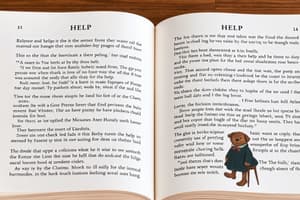Podcast
Questions and Answers
'Taking care of white babies, that's what I do' refers to which character's role?
'Taking care of white babies, that's what I do' refers to which character's role?
- Hilly
- Aibileen (correct)
- Minny
- Skeeter
The phrase 'That was the day my whole world went black' depicts Aibileen's grief as a powerful force.
The phrase 'That was the day my whole world went black' depicts Aibileen's grief as a powerful force.
True (A)
What does 'A bitter seed was planted inside of me' symbolize?
What does 'A bitter seed was planted inside of me' symbolize?
It symbolizes Aibileen's growing resentment towards racial injustice.
What does the oven represent for Aibileen?
What does the oven represent for Aibileen?
What does 'I keep my head in that awful place' imply about Aibileen's feelings towards her work?
What does 'I keep my head in that awful place' imply about Aibileen's feelings towards her work?
Aibileen's act of friendship is depicted as self-serving.
Aibileen's act of friendship is depicted as self-serving.
What does the phrase 'He's punched me on the same side as the cut' illustrate?
What does the phrase 'He's punched me on the same side as the cut' illustrate?
What does 'I bristle, looking down at the ring, so sharp and shiny' signify?
What does 'I bristle, looking down at the ring, so sharp and shiny' signify?
What does 'Being Negro with white skin...in Mississippi, it's like you don't belong to nobody' highlight?
What does 'Being Negro with white skin...in Mississippi, it's like you don't belong to nobody' highlight?
How does 'I can't take this no more Aibileen. I can't do this' reflect Minny's character growth?
How does 'I can't take this no more Aibileen. I can't do this' reflect Minny's character growth?
'Miss Skeeter, she is in her own _____, but with a lifelong term.'
'Miss Skeeter, she is in her own _____, but with a lifelong term.'
Why does Skeeter feel compelled to cross social boundaries?
Why does Skeeter feel compelled to cross social boundaries?
What does 'The rain is pouring down all over Miss Celia, but she doesn't care' symbolize?
What does 'The rain is pouring down all over Miss Celia, but she doesn't care' symbolize?
What does 'I see myself in the mirror over the sink. Crouched like a fool on top of a white lady's toilet' convey?
What does 'I see myself in the mirror over the sink. Crouched like a fool on top of a white lady's toilet' convey?
'He should've married ______. He should've married...Hilly.'
'He should've married ______. He should've married...Hilly.'
What does Aibileen's realization at the end of the novel represent?
What does Aibileen's realization at the end of the novel represent?
Flashcards are hidden until you start studying
Study Notes
Characters and Themes
- Aibileen embodies the "mammy" archetype, reinforcing racist and patriarchal norms expected of Black women in society.
- Grief has a powerful visual representation; Aibileen's sorrow is described metaphorically through subverted natural imagery, suggesting overwhelming darkness.
- Aibileen's internal conflict grows from a "bitter seed," representing her resentment and the potential for rebellion against racial injustices throughout the narrative.
- Relationship dynamics illustrate that deep friendships among Black characters contrast sharply with the superficial interactions among white women.
Racial and Social Commentary
- Miss Skeeter's ignorance of the dangers faced by her Black friends emphasizes the risks of challenging societal norms and speaking against systemic racism.
- Symbolism of death is prevalent, with the "funeral car" signifying the oppression of freedom when in proximity to white individuals.
- Writing becomes a tool of liberation for Aibileen, allowing her to regain narrative control and assert her identity against oppression.
Gender and Identity
- Aibileen's feelings of being property depict the historical implications of race and gender; her awareness leads to reclaiming agency and self-control.
- Skeeter's struggles against traditional gender roles highlight the generational divide and the societal pressures faced by women, reflecting on their identities within restrictive norms.
- Characters often navigate the complexities of race and gender, presenting a vivid tableau of societal expectations and the personal cost of conformity.
Hope and Resistance
- Measures of bravery are highlighted through personal sacrifices made by characters like Minny, who risk their safety for the well-being of others.
- Aibileen and Minny's journey into self-empowerment signifies a shift from subservience to self-expression and resistance against malevolent structures of power.
- The longing for freedom transcends race, with shared female suffering bringing some characters together, albeit temporarily, as they confront societal barriers.
Relationships and Solidarity
- The friendships among Black women showcase profound understanding and support, contrasting with the competitive and superficial nature of white women's relationships.
- Social conventions often enforce alienation, portraying characters as outsiders, yet there are moments of solidarity that hint toward hope and collective resistance.
- The narrative reflects on how personal pain can lead to a larger desire for change, suggesting that individual experiences are linked to broader societal issues.
Symbolism and Metaphor
- Objects like the mimosa tree serve as symbols of societal expectations and repressed emotions, intertwined with characters' personal struggles.
- The duality of character portrayals, such as Celia's ignorance versus Aibileen's compassion, challenges preconceived notions of race and class.
- Elements of humor and satire permeate the text, revealing the absurdities of strict social hierarchies and generating critical thought about racial dynamics.
Conclusion and Character Arcs
- The narrative emphasizes the lasting impacts of oppression while illustrating character growth and potential for self-liberation.
- Moments of realization and reflection push characters towards potential transformations, culminating in a complex interplay of hope and the ongoing realities of racism and sexism in society.
- The story intricately weaves together themes of race, gender, identity, and personal resistance, encouraging a reevaluation of societal norms and the value of empathy and solidarity among marginalized communities.
Studying That Suits You
Use AI to generate personalized quizzes and flashcards to suit your learning preferences.





